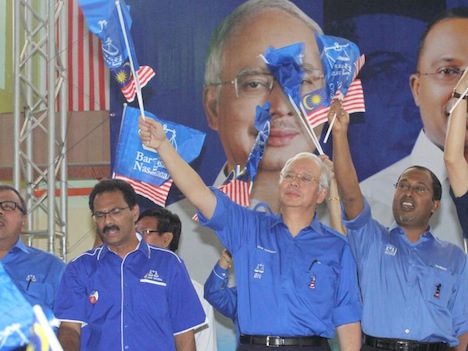 As the world nears the end of the second week of the mysterious saga of Malaysia Airlines Flight 370 with no firm explanation of how the flight disappeared on an otherwise routine trip from Kuala Lumpur to Beijing, the strains on Malaysia’s government are increasingly apparent — and the search to discover the fate of Flight 370 showcases the shortcomings of Malaysian governance.
As the world nears the end of the second week of the mysterious saga of Malaysia Airlines Flight 370 with no firm explanation of how the flight disappeared on an otherwise routine trip from Kuala Lumpur to Beijing, the strains on Malaysia’s government are increasingly apparent — and the search to discover the fate of Flight 370 showcases the shortcomings of Malaysian governance.![]()
It’s probably the first time that a global audience has taken much stock of Malaysian prime minister Najib Razak, who came to power five years ago. Najib, who is relatively more popular than the ruling Barisan Nasional (BN, National Front) that he represents, has benefitted from robust economic growth since taking office in 2009, though he arguably remains in the shadow of longtime Malaysian prime minister Mahathir Mohamad, who continues to loom large over the country’s political affairs.
But Malaysian institutions have taken somewhat of a hit this month in its sometimes sluggish, something hesitant, sometimes contradictory efforts in the search for the missing flight. Why, for example, did it take so long for the Malaysian government to admit that the airplane kept running for six hours after leaving Malaysian airspace? Was the Malaysian government purposefully concealing satellite data? Why didn’t Malaysian forces act immediately when the plane veered off course? In the aftermath of the flight’s disappearance, has the government done everything it could be doing to coordinate with the US government, the Chinese government and other nations to facilitate the search? With growing signs that the flight deliberately changed course toward the Indian Ocean, why did it take Malaysian authorities a week to investigate the pilots behind the cockpit? And by the way, why did Malaysian immigration officials allow two passengers to board an international flight with stolen passports?
It’s not just the US media — the Chinese government has become increasingly critical and impatient of Malaysia’s efforts over the past week. Chinese premier Li Keqiang pointedly demanded earlier this week that the Malaysian government provide more detailed information in a ‘timely, accurate and comprehensive manner.’
To be fair, no country would be able to mount by itself the kind of search effort that it now appears will be necessary to locate a flight that could have crashed (or landed) anywhere from Kazakhstan to the middle of the Indian Ocean. What’s more, any country would suffer the same kind of second-guessing that Malaysia is now facing.
But the errors highlight that there’s a lot that’s wrong with Malaysian governance. Continue reading How the missing airline fiasco highlights Malaysia’s weak governance

